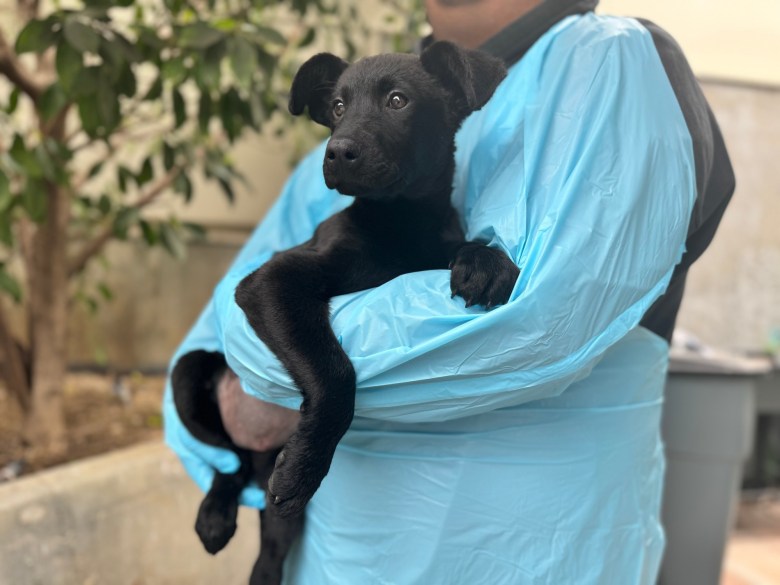Column: When to start your new pup off on the right paw? Early!

Sweet 4-month-old Dahlia (A514205) is looking for a new home. She’s one of many puppies available for adoption at Pasadena Humane. The shelter also offers training classes for puppies of all ages. Our classes are held in a state-of-the-art training facility where we follow strict sanitizing protocols to help keep puppies healthy and safe. Learn more at pasadenahumane.org
These days, it seems like we always have multiple kennels full of darling pups. The pandemic led to a drastic reduction in the number of spay/neuter surgeries performed and an increase in the number of unwanted litters.
Currently, we have 8 puppies at the shelter and 8 puppies in foster homes.
Raising a puppy is an enriching experience. And, when done properly, it’s also a lot of hard work.
As a pet parent, it’s incredibly important to start your new pup off on the right paw. A well-socialized and well-trained pup is less likely to grow into an unruly adolescent.
Unfortunately, we see many dogs entering the shelter when they are around two years old, and their behavior has become unmanageable by their owners. It’s a sad situation that can be prevented through proper training during the puppy phase.
I asked our Animal Training Manager, Rochelle Guardado, for her recommendations on setting a new puppy up for success. Here’s what she had to say:
The prime time to begin your puppy’s socialization and training is within the first three months of life. What they learn in this critical period carries over into adolescence and adulthood.
Puppies need a lot of guidance to learn how to live peacefully with us. Sure, it’s cute when your puppy jumps or nibbles on you now, but when Fido gets bigger, those behaviors can quickly become a nuisance.
Instead of concentrating on how to eliminate an unwanted behavior, think about what you’d like your puppy to do.
Show them what you want, teach them using praise and rewards, and provide outlets for your puppy to express their needs.
Puppies need to explore, chew, dig, play, and rest. Provide a small area for these activities that can expand as your puppy grows.
By leaving your pup with access to appropriate chew items and play toys, you can avoid them chewing on slippers, furniture, fingers, and other items that are not appropriate.
Gently expose your puppy to experiences and things that they are likely to encounter as an adult, such as interaction with other dogs. Attending socialization and training classes with your puppy is an excellent and safe way to prepare your puppy for adulthood.
You may have heard that it is unsafe to take your puppy out of the house until they’ve completed their vaccine booster schedule.
While visiting areas where adult dogs or unvaccinated animals frequent is not recommended, training facilities like ours are less risky.
We routinely sanitize the floors and equipment in the Pasadena Humane Behavior and Training Center with a reliable disinfectant, and we verify that all animals are up to date on vaccines.
You should look for these standards when selecting a training facility.
Also, look for a socialization class that prioritizes quality socialization over quantity. Exposing your puppy to too many dogs at once or placing very young or shy puppies in with boisterous older puppies may not achieve the outcome you’re hoping for.
All the hard work you put into training your puppy now will pay off in the future.
When you learn positive reinforcement techniques and avoid using punishment, your puppy will form a lasting, trusting and strong bond with you.
Remember, while it’s never too late to seek help from a trainer, when it comes to training, the earlier the better!
Pasadena Humane offers excellent training classes for puppies and dogs of all ages, and kittens too!
We also offer private training for dogs and cats. Learn more and sign up at pasadenahumane.org/training
Dia DuVernet is president and CEO of Pasadena Humane.
This blog post originally appeared as a column in the Pasadena Star-News on April 26, 2024.


